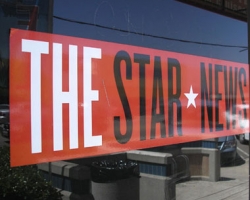On speaking with Bea Baumann the other day, we realize that the Sweetwater Manor Annual Garage Sale on May 15 is in its 25th year. In going through some of my files I think I have written about this event each of those years, enough copy, I suppose, to equal a short novel.
Actually, I like to write about this garage sale because it gives me the chance to report something about Sweetwater Manor.
The Manor, you may not know, is probably the most distinctive area in the valley. It consists of plots of ground of a half acre or greater, all anchored with houses, a heterogeneous cluster, that range in age from 80-plus years to a couple that are of recent vintage.
They also range in size from tiny, two-bedroom bungalows to estate size edifices. Our house would be somewhere in the middle. We have been in it a little more than 50 years and it is a bit larger than two bedrooms.
The story has often been told about an early developer, a fellow named Anderson, who gained title to what is now the entire hill. This was in 1926. Not having the funds to build, he heard of a subdivision in Spring Valley that was hitting on rough times. He made a deal where he bought a half dozen houses and had them moved here.
What sort of engineering feat was involved is not known, but here they are. For that matter, we don’t know how the Egyptian pyramids were built, but there they are. Anderson laid out the streets of his “city,” the principle one, of course, being named Anderson. To keep peace in the family he then named other streets Sylvia, Nanette and Margaret after the female members of his enterprise. I think that Sunnyside Drive and Racine Court came around later, no doubt, to add a bit of class to the area.
The Manor was slow to develop. In the years following its founding, perhaps a half dozen structures were added until we came to World War II. After the war there was development and building all over the county, and Sweetwater Manor was no exception. It seems that houses were added to each half acre on the hill until it reached a point of saturation. Today, they tell me, there are 92 houses on the hill, a far cry from the original six that were trucked in.
If we were to wonder what type of culture the Manor might have, we would have to rely on the annual garage sale. We have, in the past, averred that garage sales or patio sales, or whatever title one cares to hang on them is truly American. It is not one of those means of merchandising that was handed down from the old country nor did we inherit it from Native Americans. It is something that was devised, developed, detailed, and then passed on from generation to generation as a means of becoming aware of that neighbor that we seldom see and, perhaps, make a few bucks while we are at it.
It is also a great excuse to clean out that garage, the attic, or that spare room, something we probably would not do if we did not have the sale as a catalyst.
This particular garage sale was originated by Nancy Parchman, a former resident of the hill. She was a second generation native back then and probably had a plethora of stuff driving her out of house and home. As a result the garage sale on Sweetwater Manor was born. Over the years it has had a number of chairmen and a few changes to its format. There was a time when the sale was culminated with a potluck at one of the neighborhoods, but this, like many other things, has fallen by the wayside. The aforementioned Ms. Baumann, and her partner, Evelyn Adams, have spearheaded the event the past few years and have had admirable success.
So, at the break of dawn on May 15 the quiet and undisturbed Sweetwater Manor will be a beehive of activity with autos and trucks of all shapes and sizes jockeying for position along Mr. Anderson’s few streets.
And the rolling stock will have competition from the pedestrian masses, most of them denizens of the manor. And what are they looking to buy? Probably the same thing they sold in one of the garage sales of the past. Hey, that’s what gives this event its cultural aspect.










